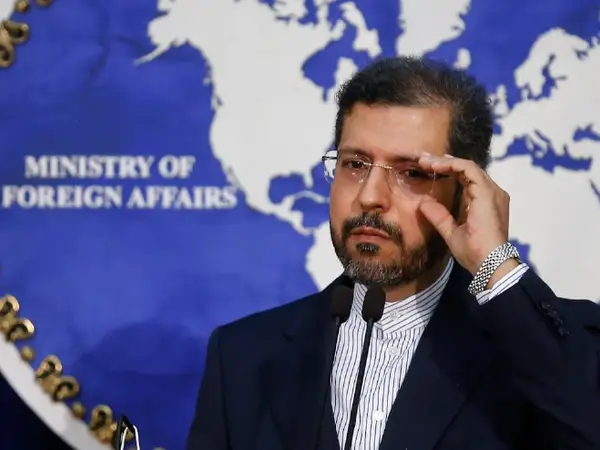Iran said Monday that the "real sides" in Vienna nuclear talks should make a deal with Tehran because the window of opportunity "will not remain open forever".
"Americans wasted our time in the [previous] six rounds of talks to preserve Trump's failed legacy," Foreign Ministry Spokesman Saeed Khatibzadeh told reporters at his regular weekly press conference on Monday. He was referring to Trump's 'maximum pressure' sanctions adding that the "real sides", presumably the United States and its western allies, should make use of the open window of opportunity because it will not remain open forever.
"Talks will go in the right direction if the US comes to the scene to resolve the impasse [in the talks]," Khatibzadeh said while reiterating that that the US is responsible for both abandoning the 2015 agreement, the Joint Comprehensive Plan of Action (JCPOA) and imposing sanctions on Iran.
Indirect negotiations with the US that Iran suspended in June resume Monday afternoon in Vienna after a five-month hiatus. Expectations of a breakthrough are low as Iran has considerably boosted its uranium enrichment during this time and claims to come to the talks with "full hands". Tehran has stockpiled 20-percent and 60-percent enriched uranium, mostly this year after the Biden Administration said it is ready to return to the JCPOA.
"We will be in a difficult place if the US is not coming to Vienna for resolving the impasses," he said and added that the US can get the "ticket for returning to the JCPOA room" only if it intends to lift its sanctions on Iran.
In the meantime, Tehran has hardened its negotiating position, demanding that all US sanctions imposed since 2018 to be removed “at once”. It is also demanding a guarantee from Washington that no future US government can pull out of agreements made with Iran. This poses a particularly difficult issue for the Biden Administration, which constitutionally cannot offer such a guarantee.
Iran's chief negotiator Ali Bagheri-Kani Sunday met with top Russian and Chinese negotiators as well as the deputy foreign policy chief of the EU, Enrique Mora.
"The makeup of the Islamic Republic's negotiating delegation reflects this resolve and seriousness for taking serious steps towards the removal of the US' sanctions against the Iranian people," Bagheri-Kani told reporters in Vienna Sunday. The team is mainly composed of financial rather than political officials as in the previous nuclear talks.
In his press conference Monday, Khatibzadeh alleged that some European parties "are seeking to prolong" the talks and criticized the publication of a joint article by the UK Foreign Minister Liz Truss and Israel’s foreign affairs minister Yair Lapid in The Daily Telegraph Sunday in which they said Britain and Israel will "work night and day" in preventing Iran from becoming a nuclear power.
"When you see the UK foreign minister write a joint article with the party that from day one has made every effort to prevent the signing of the JCPOA, to destroy it, and is still the main opponent of talks in Vienna to revive it, when you see this arrangement, you realize that at least some European countries are not coming to Vienna with the will required for lifting of sanctions," Khatibzadeh said.
Khatibzadeh also repeated Iranian claims that talks with Rafael Grossi, the head of the UN nuclear watchdog, IAEA, last week in Tehran had been left incomplete "because we did not reach a definitive agreement on some words and concepts that were important to both" but said the agreed clauses were "almost finalized".
Grossi has reported back to the IAEA Board of Governors that his agency cannot fully monitor Iran’s nuclear activities because of Tehran’s lack of cooperation.
Iran reduced IAEA’s monitoring access earlier this year when it intensified its uranium enrichment, further complicating the Vienna talks.
